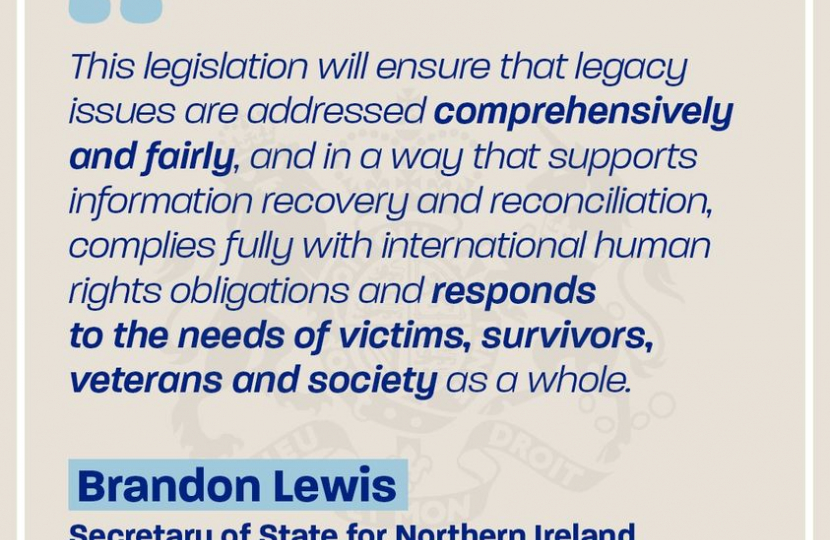
This week in Parliament, the government introduced legislation to address the legacy of the Troubles in Northern Ireland.
The Northern Ireland Troubles (Legacy and Reconciliation) Bill will fulfil the Government’s manifesto commitment to address the legacy of Northern Ireland’s past; providing better outcomes for victims, survivors and their families and giving our veterans the protections they deserve.
Commenting, Richard Fuller MP said:
This Bill delivers on the government's commitments to those who served in Northern Ireland, while implementing a process that provides answers for families. For too long, veterans and former service personnel have lived in fear of prosecution for actions taken whilst serving their country in order to uphold the rule of law. The Bill not only gives veterans the protections they deserve, but provides better outcomes for victims, survivors and their families.
Key is the establishment of a new Independent Commission for Reconciliation and Information Recovery, that will allow individuals and communities affected by the Troubles to seek and receive information about Troubles-related deaths and serious injuries.
Following publication of the Command Paper in July 2019 and an extensive period of engagement, the government has listened to what people have said about keeping open the prospect of criminal justice outcomes, and has adjusted its approach to remove any automatic access to immunity for those involved in Troubles-related incidents. Instead, the independent body will grant immunity based on an individual’s cooperation with the body’s enquiries. This approach gives veterans the certainty that they deserve but leaves open the route of prosecution if individuals are not deemed to have earned their immunity. For those who do not come forward, the possibility of prosecution will remain.
The Northern Ireland Troubles (Legacy and Reconciliation) Bill will include the following provisions:
-
For victims and survivors, a new independent body - the Independent Commission for Reconciliation and Information Recovery (ICRIR) - will conduct investigations, consistent with our international obligations, to provide answers for those who want them, in a process supported by full state disclosure and with the power to compel witnesses.
-
The ICRIR will grant immunity from prosecution, based on an individual’s cooperation with the body’s inquiries. Those who do not cooperate with the independent body will not be granted immunity, and will remain liable to prosecution should sufficient evidence exist, or come to light.
-
Alongside producing reports on cases it has investigated, the body will also produce a historical record of what is known in relation to all other deaths that occurred during the Troubles.
-
A package of memorialisation measures centred on an ambitious, expert-led oral history initiative that will encourage people from all backgrounds to share their experiences and perspectives of the Troubles, and to listen to those of others.

